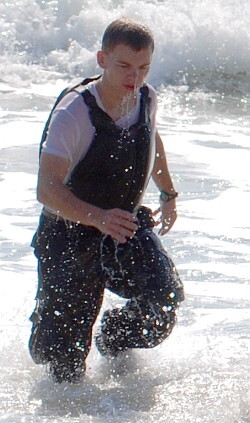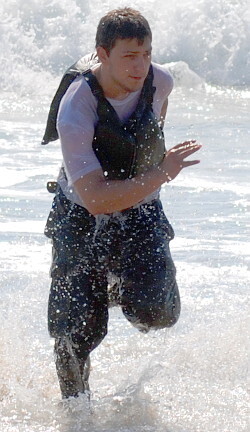Running in Sand and Water
Running on the beach varies a bit from cross country or mud running, a good workout because the sand is soft and easy on the joints, like grass, but can be hard work when you get wet.
Not all sand is the same. Wet, compact sand is a lot easier to run on than completely dry sand. Even running on wet compact sand is going to feel a lot harder than running on tarmac.
When running on sand, each footfall is slightly different. The surface has so much give means we have to work our lower body muscles a lot harder than running on a hard surface like tarmac.
This is why it feels so hard. Each minute on sand feels like two on the road. But it’s worth persevering because the benefits are immense.
Why is it so Hard to Run on Sand?
The reason that running on sand is so hard is that every time you attempt to push off it, it gives way, requiring you to exert approximately 1.6 times the energy that would be required to maintain the same speed on solid ground. Mostly the underfoot "give" is less than half an inch.
For walkers, make that 2.1 ot 2.7 times for energy.
Because the sand is so soft and moves with each step,
the muscles have to generate a slightly greater force than running on a hard surface in order to move.
Low Impact
Beach running is much better in terms of impact on the joints and bones than running on tarmac and concrete. You will however run slower on sand than on grass or road, so don't base your road time on what you can do on the sand. When you do hit the road it will seem easy.
In 1998 a comparative study of 60 men aged 15 to 21 in Turkey showed
that sand running produced a greater increase in calf circumference over road running
and a larger boost in maximum aerobic power (VO2max).
The calf size increases came from the muscle overload effect.
The VO2max jump resulted from the sand group's working harder to keep up with the road runners.
Go Both Ways
Watch out for camber on the beach. Don't just run one way along the beach or you'll find the slight incline may impact your stride a bit. Ideally run one way and back the other, to avoid too much stress on one side.
Increase the Training Level
You can adjust the training level with the amount of clothes you wear and how wet they get during your training. The more you splash as you run, the more water your clothes soak up and make it harder for you to run. A wet jogging suit can become a fair challenge.
Run close to the Water
When you run on sand you may find running close to the water gives a firmer sand basis.
It is also good practice for big races as you quite often have to dodge waves and thus detour from the straight line.
Run in the Water
A relaxed jog along the water's edge is easy. For a slightly greater challenge you can run in the water. Vary the depth to adjust the resistance. When you kick your feet hard forward, you get soaked in a lot of spray. Jump over small waves like in an obstacle race. If you misjudge a big wave you can get very wet when it pushes you over.
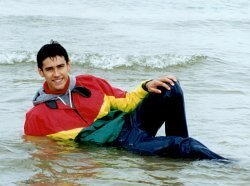
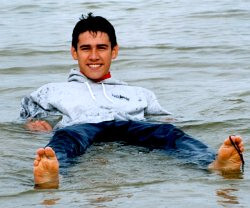
Run into the Water
This requires careful tactical planning, when and where you want to run into the water. Your clothes will get wet and heavy, which makes your run much harder and your training more intense. If you wear baggy clothes, they may slop around a fair bit, slowing you down.
Tough runners may start off with a swim, beginners save it for the final sprint. Some runners take refreshing dip on the far side of the beach, and then run back. Depending on your fitness level, you can choose one or more dips during your run.
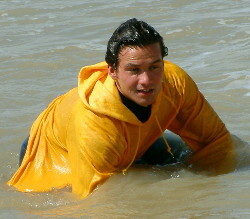
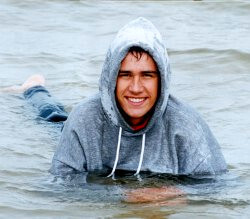
Reader Story: Beach Boot Camp
by Sean from Portmouth, EnglandWhile searching for a proper fitness training program, I met a group of active and retired military personnel who go sea swimming several times a week. Our sessions are tough, but huge fun. We start with a swim to get our clothes wet, then we run 300 meters, go for another dip, and carry on until we can't keep it up any longer. We finish with a relaxing swim and then run back home.
